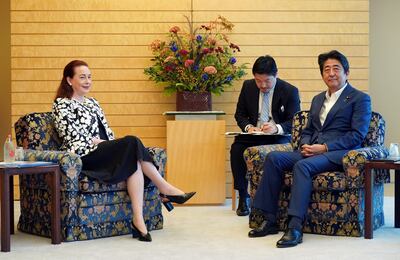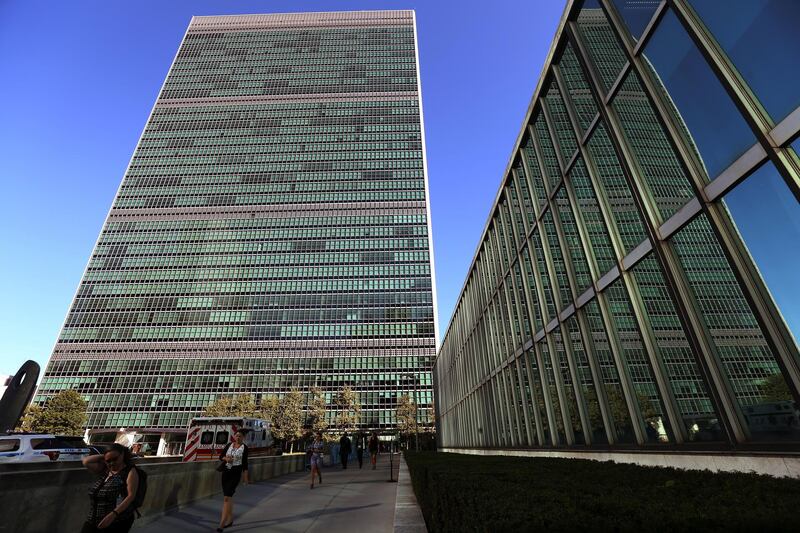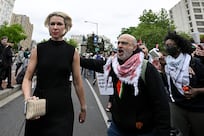The 73rd session of the United Nations General Assembly began on September 18.
Heads of state, diplomats and political advisers from around the world will converge on the UN headquarters in New York City in the course of the gathering to debate and discuss international issues.
Here is everything you need to know about the meeting:
What is the United Nations General Assembly?
The United Nations General Assembly is the main deliberative body of the UN. It is one of six organs of the UN, and makes decisions on important questions concerning peace and security.
The UNGA was established in 1945 under the Charter of the United Nations, and comprises all 193 members of the UN.
The UNGA is also made up of various boards, commissions, committees, councils, panels and working groups. The subject of these sub-bodies will focus on both the running of the General Assembly and discussion of priorities and issues.
What is the General Debate?
Every year the representatives from each member state - often the head of state - take turns to address the assembly in a General Debate lasting five days.
Each speech is allotted 15 minutes, although they can overrun. The longest speech in UN General Assembly history was made by Cuba's then-Prime Minister, Fidel Castro lasting for more than four hours.
In 2006, Venezuela's President, Hugo Chavez, labelled the then-US President, George W. Bush as "the devil," saying the podium still "smells of sulphur" from Mr Bush's speech the day before.
Three years later, Libya's Muammar Qaddafi, reading from a sheet of handwritten notes, exceeded his allotted time by 85 minutes, speaking for more than an hour and a half, in a furious rant against the Security Council.
The schedule for this year's General Debate can be found here.
What is the theme of the UN General Assembly General Debate 2018?
The theme of the general debate in 2018 is "Making the United Nations relevant to all people: global leadership and shared responsibilities for peaceful, equitable and sustainable societies."
It was announced by this year's president as a part of her key aims.
_______________
UNGA 2018
[ UN General Assembly General Debate 2018 schedule ]
[ Russia working on Lavrov and Pompeo sideline meeting ]
Comment: Peace talks and conflict resolution will be played out in the UN theatre
_______________
When does the UNGA meet?
The UNGA meets from September to December each year, and then from January to August as required.
The 73rd session of the UNGA will open on September 18 2018. The first day of high-level debate will begin on September 25 and will last for nine working days ending on October 5.
Where is the UNGA?
The UNGA takes place in the UN's permanent headquarters in New York, where it has been held since October 1952.
Who attends the UNGA?
Each of the 193 member states of the United Nations has a representative at the UNGA. Each representative will have delegations – teams of diplomats – to assist in policy decisions.
Who is María Fernanda Espinosa Garcés, the president of the UNGA?
The UNGA's president changes every year and is elected shortly before each session begins. The president sets the vision for the session.
This year, the president is María Fernanda Espinosa Garcés from Ecuador, whose key aim is to make the United Nations more relevant to all, increasing transparency and efficiency.
A politician and poet, Mrs Espinosa will be the fourth woman to preside over the UN General Assembly. Mrs Garces will also be the first woman ever from Latin America and the Caribbean to be elected as President.
“As you know, I am also a poet as well as a politician. As such, I am fully aware that no view is useful if we do not see, and no word has value, if we do not listen. I will be ready to listen to you all and work for, and with you,” she said in her acceptance speech.
Mrs Espinosa says she wants to focus on climate change, peace in the Middle East, and tackling inequality.

Each year, a regional group nominates a single candidate who is then rubber-stamped by the Assembly, but this year the Latin America and Caribbean Group could not decide on a single nominee, so the Assembly voted on the candidate, which Mr Espinosa won by a margin of 66 votes.
Serving as Minister of Foreign Affairs and Human Mobility, Minister of Defence, and Co-ordinating Minister of Cultural and Natural Heritage in Ecuador, Mrs Espinosa has extensive experience in politics.
As a writer, she has published more than 30 academic texts, and five volumes of poetry, receiving the Ecuadorian National Poetry Prize in 1990.
How does the UNGA make decisions?
Each of the member nations has one vote. Votes taken on important issues like budgets or peace require a two-thirds majority, while other questions are decided with a simple majority.
Recently, the UNGA has been attempting to reach a consensus instead of relying on a formal vote. The president can decide to adopt a motion without a vote after conferring with the appropriate delegations.
What powers does the UNGA have?
The UNGA can make recommendations to member states on international issues. It can initiate international actions on political, economic, humanitarian, social and legal issues.
For example, in 2000 the UNGA announced the Millennium Development Goals – specific goals for member states to achieve levels of development and peace. These were followed up in 2015 with a set of 17 Sustainable Development Goals.
The UNGA also:
- considers and approves the UN budget
- elects non-permanent members of the security council
- discusses questions of international peace and security, and of the scope of the UN Charter, unless the Security Council is currently discussing it
- initiates studies into international issues
- makes recommendations for the peaceful settlement of any situation
- considers reports from other bodies





